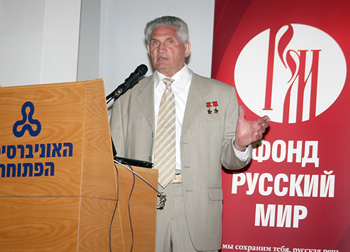Heavens Above: Russian Jewish Cosmonaut
at Space Exploration Conference at OUI

Colonel Volynov, decorated with the Hero of the Soviet Union and the Order of Lenin medals, was the commander of the Soyuz 5 mission in 1969, and the Soyuz 12 mission in 1976.
From Canada to New Zealand, Russia to Israel, April 12th was an international celebration of space research and, in particular, human space missions. Dubbed "Yuri's Night," the Open University played host to Israel's experts on space research and exploration. In addition, the Ra'anana campus hosted twice-decorated Hero of the Soviet Union and the first Jewish cosmonaut, Colonel Boris Volynov, who was a special guest of the Russkiy Mir Center for Russian Culture of the Open University.
Colonel Volynov, along with Russian cosmonaut Yuri Gagarin, was a member of the first group of Russian cosmonauts. Gagarin was the very first human to break the bonds of earth, 39 years ago when he soared into outer space on Vostok 1.
These men set into motion the space race, which has led to a plethora of technological developments that have changed just about every area of our lives today. The next time you go for an MRI, don thermal boots before skiing, watch a child toss a Nerf glider, or press the button on your microwave, realize that all of these inventions and technological developments are an outgrowth of space exploration.
Space travel and exploration have come a long way since 1961, the year that launched the space race between the USA and Russia (Gagarin, by the way, never flew in space again; sadly he was killed in March 1968 while on a training mission). Today, space exploration is a cooperative effort transcending borders and continents.
Yet, for the first time since 1961, the USA is without a government space program, and much of space exploration is now moving into private hands. That doesn't mean that NASA or other space agencies around the world are out of the picture, but their goals have changed over the years. For NASA, which is "looking to bring men further away and faster," Mars, rather than the moon is the main objective.
What new developments can we hope to bring back from these missions? One is the supply of enough clean energy to last us a billion years. But first technology must be developed to enable such space flight, and a myriad of psychological, physiological, medical and even basic equipment issues have to be handled before we can hope to enjoy the fruits of Mars exploration. Most experts agree that this cannot happen before 2040-2050.
Until then, we can continue, however, to enjoy the fruits of joint international cooperation, the development of new technologies, and even Israel's role in ongoing space exploration.
|